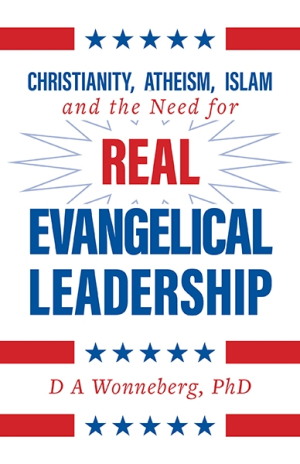Christianity, Atheism, Islam and the Need for Real Evangelical Leadership
This book is recommended reading for evangelicals searching their consciences in the wake of the 2016 election.
“Hate and wealth are central themes in politics today,” organizational psychologist D. A. Wonneberg writes in Christianity, Atheism, Islam and the Need for Real Evangelical Leadership. His book has particular relevance in the wake of the 2016 American election. Wonneberg examines the role religion does and should play in the political realm, explaining the fundamentals of several key faith systems to obviate misunderstandings.
Wonneberg has a PhD in organizational psychology, and his research specialties include narcissism, leadership and communication styles, and verbal abuse. This expertise, along with the murder of his Eastern European ancestors by Hitler and Stalin, makes him well placed to comment on the rise of Donald Trump. Although the bulk of the book was likely written before the results of the 2016 election were known, the book is still potent in cautioning against moves toward fascism. It explores the president’s personality and the contradictions of evangelical Christianity, and it comprehensively addresses atheists’ specific objections. Less convincingly, it posits the worldwide decline of Islam and labels this an opportunity for Christian evangelizing.
The book’s approach is to state the facts about Christianity, atheism, and Islam as plainly as possible to correct any misjudgments. Chapters 4 and 5 are especially effective at laying out the basics of Christianity through the Ten Commandments and the life of Jesus, respectively. The author emphasizes, though, that the commandments and the teachings of Jesus are usually underestimated or not followed in spirit. That contrast between ideals and practice informs a following chapter about evangelicalism, in which Wonneberg bravely addresses contradictions at the heart of right-wing politics: small government but big military; a focus on sexual immorality while ignoring Jesus’s words about aiding the poor and making peace.
Here and throughout, the author is careful to back up his criticisms of Christianity with pertinent scripture passages. Where he feels Christians are missing the mark, he counters with an unambiguous assertion from the Bible. For instance, he compares the racist and propagandist tendencies of the current regime with the New Testament’s model of “peaceful leadership without seeking illicit power and financial gain.” However, the passages used in response to atheists’ arguments are often overlong, and interlocutors who don’t already value the Bible are unlikely to find any of them particularly convincing.
The book shows a deep understanding of the psychology of “nones,” or those with no faith—who now include nearly one-quarter of Americans, to the author’s chagrin. Unfortunately, though, its sweeping statements about Islam reflect an outsider’s view. The brief account of the Prophet Muhammad is taken from Wikipedia, and the use of limited web resources—as seen in the bibliography—does not reflect a sincere engagement with the philosophy and current practice of the religion.
Instead, Islam is simply branded as violent and repressive: “Islam’s members are largely victims who have never experienced true freedom.” The author takes the Arab Spring as proof that Islam is on the decline: “respect for Muhammad is fading” and “Islam is in a death spiral from which it will not recover.” Such triumphalism and cultural insensitivity seem out of place in a book that is otherwise quite measured.
This book is recommended reading for evangelicals searching their consciences in the wake of the 2016 election and wondering how to go forward with biblically sound theology.
Reviewed by
Rebecca Foster
Disclosure: This article is not an endorsement, but a review. The publisher of this book provided free copies of the book and paid a small fee to have their book reviewed by a professional reviewer. Foreword Reviews and Clarion Reviews make no guarantee that the publisher will receive a positive review. Foreword Magazine, Inc. is disclosing this in accordance with the Federal Trade Commission’s 16 CFR, Part 255.

